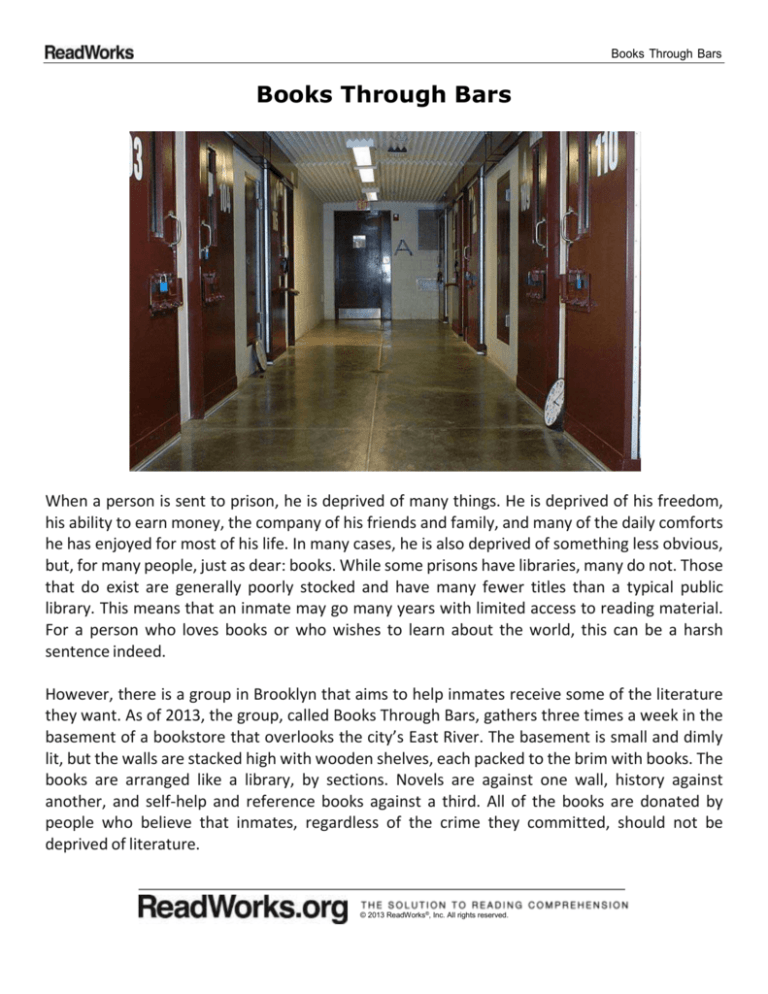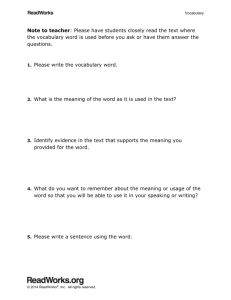
Books Through Bars
Books Through Bars
When a person is sent to prison, he is deprived of many things. He is deprived of his freedom,
his ability to earn money, the company of his friends and family, and many of the daily comforts
he has enjoyed for most of his life. In many cases, he is also deprived of something less obvious,
but, for many people, just as dear: books. While some prisons have libraries, many do not. Those
that do exist are generally poorly stocked and have many fewer titles than a typical public
library. This means that an inmate may go many years with limited access to reading material.
For a person who loves books or who wishes to learn about the world, this can be a harsh
sentence indeed.
However, there is a group in Brooklyn that aims to help inmates receive some of the literature
they want. As of 2013, the group, called Books Through Bars, gathers three times a week in the
basement of a bookstore that overlooks the city’s East River. The basement is small and dimly
lit, but the walls are stacked high with wooden shelves, each packed to the brim with books. The
books are arranged like a library, by sections. Novels are against one wall, history against
another, and self‐help and reference books against a third. All of the books are donated by
people who believe that inmates, regardless of the crime they committed, should not be
deprived of literature.
© 2013 ReadWorks®, Inc. All rights reserved.
Books Through Bars
In the middle of the room is a table, piled high with letters. The letters come from prisons and
jails all over the country. Books Through Bars advertises itself in magazines and pamphlets read
by inmates. In the ads, they ask inmates to send them requests for books. So, the inmates write
in, asking either for specific titles or books on a particular topic. The volunteers then try to match
the requests to books in the Books Through Bars library. Each inmate receives two or three
books. When the volunteer has selected the books, he or she wraps them in paper cut from old
grocery bags, writes the address of the jail or prison the inmate lives in on the front in black pen,
and adds the package to a stack of packages to be mailed. In one corner of the basement are
milk crates filled with brown‐paper packages, waiting to be taken to the post office.
Since the library is relatively small—it has only a couple thousand books—matching the inmates’
requests can sometimes be difficult. One inmate writes in asking for a book about ancient
civilizations, like the Mayans and Aztec.
“To whom it may concern,” the postcard says. “I would please like some books on Aztec culture
or Mayan books. I am real interested in the history of my great ancestors. There is a book called
‘Aztec Thought & Culture’ by Juan Portillo Leon. If you could please send me a copy of that
paperback book or any related to Aztec culture I would really appreciate this. Thank you, Mario.”
Since the library doesn’t have any of these books, the volunteer finds two related books. One is
about ancient Greek civilization, while another is about modern Mexico. Neither quite fulfill the
inmates’ requests, but the volunteers try to get as close as they can.
Requests for books about ancient civilizations, especially from Latin America, the Middle East,
and Africa are common. Books about psychology, self‐help, and radical politics also rank high.
In general, though, preferences among inmates vary widely. A man in a low‐security jail in Miami
wants “Lord of the Flies” and “Who Moved My Cheese?” A man in a maximum security prison
in California wants books about meteorites and asteroids. A man serving a triple life sentence in
Indiana asks for a copy of Tolstoy's "Master and Man."
In addition to requests for history or science books, other inmates looking towards their release,
ask for books about finding jobs or about taking the GED—a test you can take that is the
equivalent of a high school diploma. The single most popular request is for a dictionary. While
in prison, many inmates are trying to appeal their cases—meaning that they are asking for the
verdict to be overturned. When writing their appeals, they need a dictionary to make sure they
spell the words correctly. Others just want to improve their vocabulary.
© 2013 ReadWorks®, Inc. All rights reserved.
Books Through Bars
Most of the inmates take a formal, almost meek tone in their letters. “To Whom It May
Concern,” begins one. “Firstly, I would like to extend my heartfelt gratitude for such a program
and I would like to thank you in advance for this service, and it should be known that you are
making a profound difference in people’s lives who are already in a situation where despair and
boredom are constant companions.” The author goes on to request a copy of “A Lawyer’s Life”
by Johnnie Cochran.
Among inmates who ask for fiction, fantasy books are the most popular. A man writing from the
secure housing unit of Pelican Bay State Prison in California asks for novels by Terry Goodkind
and George R.R. Martin. “I spend 23 hours a day in a cell,” he writes, “and to keep the reality of
this place in check and to maintain a bit of sanity in this dark place, I submerge myself in a world
of books.”
The letters are almost always handwritten, usually in pencil, on leafs of notebook paper or on
the backs of prison scrap ‐‐ commissary lists, visitation forms, memos from the warden. One
man from Phoenix sends a postcard. On the front is a color photograph of a group of men
wearing black‐and‐white striped uniforms, like convicts in old prison movies. They are huddled
under a giant tent, behind a wire fence. The printed legend reads, “Hello from Sunny Arizona!”
On the back, a caption explains that these men are inmates in the world’s largest tent jail, run
by Sheriff Joe Arpaio.
Prison officials have the right to deny admittance to books they deem dangerous to their
institution or capable of undermining the prisoner’s rehabilitation. In such cases, they send the
book back with a form letter explaining the reason for the rejection. This reasoning can
sometimes seem unsound. An administrator at Northern Correctional Institution in Somers,
Connecticut, rejected the primer “Introduction to Psychology” by Ann L. Weber as a threat to
security and safety of the prison. A novel by George Orwell called “Burmese Days,” based on the
years the famous author spent living in Burma, was rejected by the state of Texas because of
similar concerns that it would cause a riot.
Books Through Bars in New York is only one of many groups in dozens of other cities that send
books to inmates. While the group in Brooklyn sends books to inmates all over the country,
some concentrate mainly on inmates within their state. Many of the volunteers in Books
Through Bars hold different views on prisons and inmates. Some believe that the sentencing of
inmates is too harsh, while others believe it is mostly fair. However, what binds the volunteers
together is a belief that all of the inmates still have a right to read books.
© 2013 ReadWorks®, Inc. All rights reserved.
Questions: Books Through Bars
Name:
Date:
1. Why do people in prison have books sent to them?
A People in prison have books sent to them because stores are looking to get rid
of their extra books.
B People in prison have books sent to them because some prisons have no
libraries and others have only poorly stocked ones.
C People in prison have books sent to them because judges order them to read in
prison.
D People in prison have books sent to them because they have to go to school
while they are in prison.
2. The group Books Through Bars was started to address what problem?
A Books Through Bars had too many books and needed to make space.
B Books Through Bars needed to find a way to teach inmates the group’s political
ideas.
C Prisoners who wanted to read often had no access to books.
D Prisoners were threatening the security of prisons after reading controversial
books.
3. Books Through Bars gets thousands of letters from people in prison around the
country requesting books. Based on this evidence, what conclusion can be drawn?
A
B
C
D
The wardens make them write letters as part of their sentence.
People in prison are bored and will write to anybody.
The organization can help people get out of jail.
Prisons often don’t have enough books for prisoners who want to read.
4. Read the following sentence from the text: “I would like to thank you in advance for
this service, and it should be known that you are making a profound difference in
people’s lives who are already in a situation where despair and boredom are constant
companions.” Based on the evidence in this sentence, how was the letter writer feeling?
A
B
C
D
grateful
annoyed
confused
surprised
1
© 2013 ReadWorks®, Inc. All rights reserved.
Questions: Books Through Bars
5. What is the main idea of this passage?
A
B
C
D
Judges should order prisoners to read as part of their sentences.
Even people who commit crimes deserve the opportunity to read.
People who commit crimes are too dangerous to read books.
Books Through Bars does not believe in jailing people when they commit
crimes.
6. Read the following sentences: “When a person is sent to prison, he is deprived of
many things. He is deprived of his freedom, his ability to earn money, the company of
his friends and family, and many of the daily comforts he has enjoyed for most of his
life.” As used in the passage, what does the word deprived mean?
A
B
C
D
permitted
given
denied
encouraged
7. Choose the answer that best completes the sentence below.
The organization Books Through Bars sends books to prisoners
don’t have libraries, or have small libraries.
A
B
C
D
prisons often
although
before
yet
because
8. Why did a group of people in Brooklyn start the organization Books Through Bars?
2
© 2013 ReadWorks®, Inc. All rights reserved.
Questions: Books Through Bars
9. In the passage, the writer describes that some prisoners request novels, others want
self-help books, and still others want books about history. Based on this evidence, what
conclusion can be made?
10. Explain how Books Through Bars has impacted the lives of prisoners by using
information from the passage.
3
© 2013 ReadWorks®, Inc. All rights reserved.
Teacher Guide & Answers: Books Through Bars
4
© 2013 ReadWorks®, Inc. All rights reserved.





